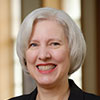This article is more than 5 years old.
“Qualities of great leadership are: focus, passion, wisdom, courage, and integrity.” Lee Bolman
The above quote might make you think this institute was just a series of sage tidbits, but it really was a highly personal and potentially transformational experience. The class was over 100 academic librarians in leadership positions mostly from the U.S., with some Canadians and a few other internationals, including several from South Africa.
For several months prior to the institute, I worked away at reading the 443 pages of the fourth edition of Reframing Organizations: Artistry, Choice, and Leadership (ISBN 9780787987992), which was packed with real life examples, and was enlightening even before I arrived in Cambridge, MA. (I will add the book to our collection.) We were fortunate to have Lee Bolman, one of the authors of this primary text, as an instructor during the week. The book teaches about viewing problems or challenges with 4 different perspectives, or frames, in mind when trying to make sound decisions: structural (e.g. the organizational chart, or organization as a whole), human resources (meeting the needs of individual people), political (inside and outside of your institution), and symbolic (overview of past, present, and future in story-like terms).
Copious additional readings each night with the brain-straining intensity of discussion each day made for a tiring week, but it was highly educational and satisfying. I learned what a case study really is and I did find it to be a useful tool for learning. I won’t describe the rest of the content and structure because it was 98% the same as Susan’s experience in 2008. Susan’s description of the frames is also the same as what I heard; I just gave one of the variations above. To read Susan’s posts (recommended!) scroll down on this page until you see the category “2008 Leadership Institute for Academic Librarians” (on the right) and click it.
I cannot even begin to come close to sharing all of the benefits of the institute in writing this post, so come chat if you want! Here are some thought-provoking nuggets (and I’m quoting and paraphrasing from various instructors):
- People have different concepts of what leadership is, so any given leader is going to get mixed reviews in the effort to meet expectations.
- Where are we likely to succeed or fail in our responsibilities, especially in the context of a changing environment?
- When our world changes, we need to notice and adapt. Because we don’t want to go the route of the buggy whip or Lisa (from Apple). This is why these blog posts are so important — they help us to take note of what is changing outside of WFU so that we can think about what we need to do differently.
- Often we have more power than we think we do. There was a whole segment on “leading from the middle” which I believe every single full-time employee in ZSR does. Bolman was the instructor and he also said, “Leading from the middle takes:
- doing your homework;
- working up and down [the org chart];
- openness to learning and new possibilities;
- courage.”
- Why is change so difficult, even when we are genuinely committed to it? We went through an exercise designed to force one to dig down to the hidden reasons that are preventing behavioral changes. This short article explains it in plain language: Kegan, Robert and Lahey, Lisa. “The Real Reason People Won’t Change,” Harvard Business Review (November 2001): 84-92. Lahey was the instructor for this segment.
- Change always looks like failure from the middle of the process.
- How leaders go astray:
- They see the wrong picture (through misreading or missing important clues or not knowing how to decode the clues, or through disrespecting other groups’ perspectives and cultures);
- they lose key constituents;
- they don’t recognize when the world has changed around them.
Again, there was ever so much more and I’d rather tell you in person instead of trying to include more here, so ask me!

3 Comments on ‘Harvard Leadership Institute for Academic Librarians — Class of 2010’
I’m glad to hear you also had a positive experience. It sounds like it was a very nice addition to have one of the authors of the Reframing Organizations book.
I’d love to hear more. Let’s have lunch sometime!
Great summary Lauren, and thanks for the hyperlink to the text!